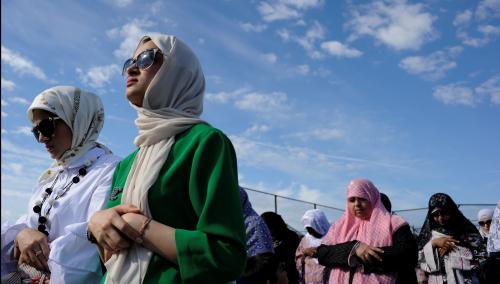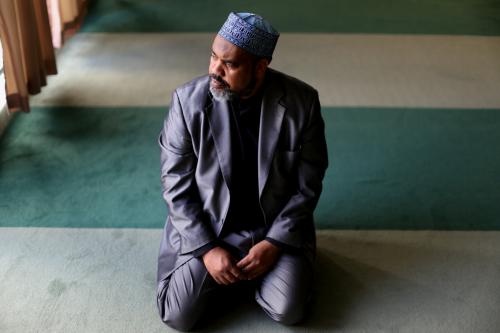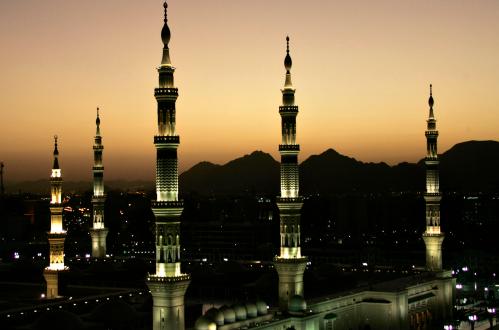Shadi Hamid writes that as both an American Muslim and as someone who studies Islam’s role in politics, he has increasingly come to appreciate just how complicated a religion Islam is, especially if you’re coming at it with Christianity as the main point of comparison. He looks ahead to the challenges inherent in President Trump’s planned speech on Islam in Saudi Arabia. This piece originally appeared in The Atlantic.
In an unexpected development, President Donald Trump is slated to give a speech on “Islam” in Saudi Arabia, as part of his first presidential trip abroad. In a May 16 briefing, National Security Advisor H.R. McMaster explained that the address would focus on “the need to confront radical ideology” and “the president’s hopes for a peaceful vision of Islam to dominate across the world.”
As both an American Muslim and as someone who studies Islam’s role in politics, I’ve increasingly come to appreciate just how complicated a religion Islam is, especially if you’re coming at it with Christianity as the main point of comparison. It worries me, then, that someone as deeply irreligious as Trump, who has apparently thought so little about what religions are, and what they mean, will give a speech about an entire religion (can you imagine Trump giving a speech “on Christianity”?).
Even the most well-intentioned presidents have struggled to find the right way to talk about Islam. Barack Obama, perhaps more than any other previous president (with the possible exception of Thomas Jefferson), came into office with considerable knowledge of Islam and Muslims. But Obama struggled to take the religious motivations of extremists seriously, dismissing ISIS as a bunch of “thugs” and “fanatics.” When he addressed the role of Islam more directly, he had a tendency to lapse into patronizing clichés, exhorting Muslims to become more “modern.” There was also the odd spectacle of Obama’s top diplomat, Secretary of State John Kerry, making theological pronouncements and deeming ISIS to be “apostates.”
Trump, though, comes into the speech with much lower expectations, considering that Trump is America’s first openly Islamophobic president in at least a century. It is difficult to remember it now, but Trump did in fact say “I think Islam hates us.” It is also not encouraging that controversial senior aide Stephen Miller is reported to be drafting the speech. Yet, anything Trump is likely to say in Saudi Arabia will be an improvement; it is difficult to imagine even Trump, at least with a prepared speech, saying something outlandish about Islam in front of his Muslim hosts.
The cognitive dissonance goes well beyond Trump’s own views and extends to his awkward hosts. Saudi Arabia, as the custodian of the two holy mosques, makes some sense as the site for a speech on Islam. Yet, as one of the world’s only theocracies, Saudi Arabia is a somewhat odd choice for a speech intended to promote tolerance and “moderation.” The kingdom, however, is often grouped by U.S. policymakers in the “moderate” camp, simply because it is an ally and supports American national security interests. The goal, then, is not tolerance, as much as it is finding ways to use and instrumentalize Islam and Muslims to fight terrorism.
But perhaps the most glaring problem is the very premise of the speech—the assumption that theology holds the key to combating extremism. Religion matters, of course, but the U.S. is on weakest ground when it inserts itself into internal debates over Islam and its role in politics. More importantly, though, the focus on religion runs the risk of distracting the U.S. from the political factors that it can more readily shape. It is no mistake that the two countries where ISIS gained the most ground were the two most riddled by civil war. The collapse of the state in Iraq and Syria left a vacuum that groups like ISIS could easily exploit. It is unlikely, however, that Trump will discuss the role of civil wars in facilitating terrorism, because that would require addressing America’s role in promoting state-building, something that, up until now, Trump has shown little interest in.
That said, this speech is not an occasion for hoping for the unlikely or the impossible. This is a time for hoping for minor, but meaningful, improvements. McMaster, in previewing Trump’s trip, referred to Islam as one of the world’s three “greatest religions” and included Islam as part of a common civilizational front against extremism. That might not be saying a lot, but it is a far cry from the Islamophobia of the campaign. Having lowered the bar, let us see if Trump can clear it.







Commentary
Trump’s Islam speech and the blessings of low expectations
May 19, 2017